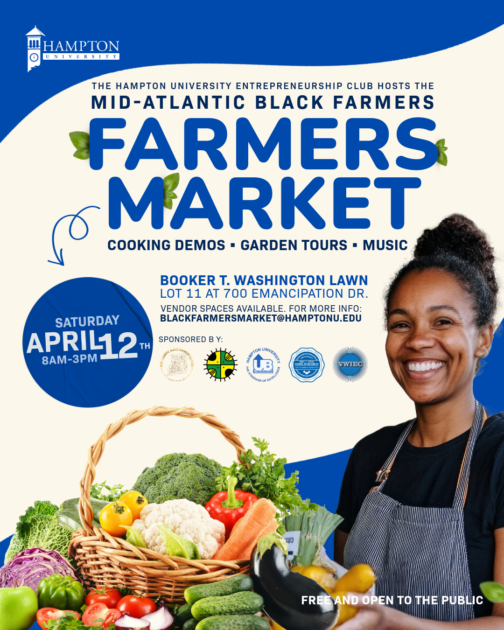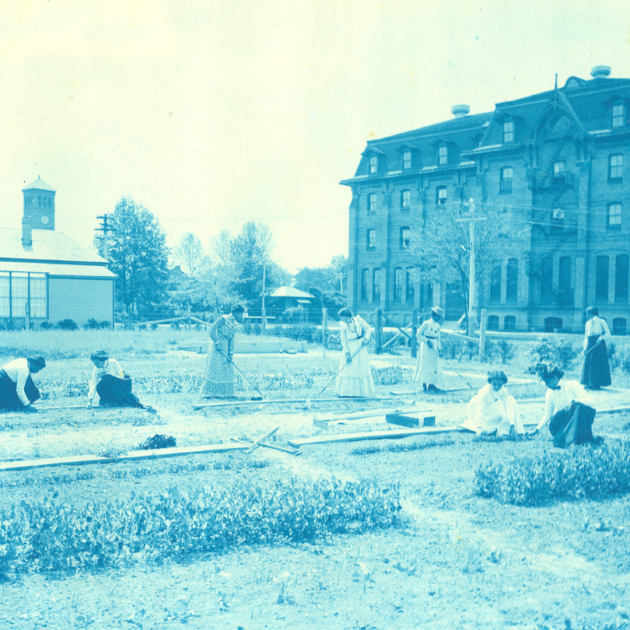The Mid-Atlantic Black Farmers Market HBCU Tour Stops on Campus

Hampton, Va. (April 1, 2025) – Hampton University is taking a bold step in addressing food insecurity and economic empowerment by hosting the Mid-Atlantic Black Farmers Market (MABFM) HBCU Tour on April 12 from 8 a.m. to 3 p.m. on the Booker T. Washington Lawn. With Black farmers representing less than 1% of all U.S. farmers and facing disproportionate land loss and funding barriers, this initiative—led by the James T. George School of Business Entrepreneurship Club—provides a crucial platform for economic opportunity and food justice. More than a marketplace, the event will connect over 30 Black farmers, artisans, and entrepreneurs with students and the community, reinforcing Hampton’s commitment to sustainability, entrepreneurship, and its deep agricultural legacy.
The market will feature vendors providing a variety of fresh produce, homemade goods, handcrafted items, and artisanal products—all while supporting Black-owned businesses and strengthening community ties. Farmers markets like this provide essential access to healthy, local, and often organic food, bolster the regional economy, and foster a spirit of collaboration and self-sufficiency.
“Hampton University is rooted in excellence,” said Ziette Hayes, dean, James T. George School of Business. “From its inception, this institution has been a leader in education, economic development, and community empowerment. The school of business partnership with tour is a powerful step in revitalizing our agricultural heritage and continuing our legacy as a hub for innovation.”
A Nation in Crisis: Addressing Food Insecurity
America is facing a growing food crisis. In 2023, one in six Americans relied on food banks, and recent cuts in the United States Department of Agriculture (USDA) food assistance—over $660 million in canceled deliveries to schools and food banks—have placed even more strain on local food providers like farmers, local growers, and the community. The impact is disproportionately felt in communities of color, making events like this not only vital but urgent.
Additionally, the White House cut, then later reimplemented, the 1890 National Scholars Program. In 1992, this program expanded to cover the full tuition, as well as room and board, for underserved or rural students interested in studying food, agriculture, natural resources, and other sciences at Historically Black Colleges and Universities (HBCUs) established as land-grant institutions. This move has had longstanding effects on student support programs, funding, and long-term solutions for underserved students. And while many view farmers as low-skilled workers, the truth is that agricultural roles require skills in logistics, technical knowledge, crop production, livestock management, soil science, irrigation and water management, and more.
Furthermore, approximately 23.5 million Americans, or about six percent of the population, live in areas considered food deserts, where access to affordable and healthy food is limited. Additionally, over 54 million Americans are food insecure, meaning they struggle to have reliable access to enough food for an active, healthy life according to the USDA.
A Legacy of Excellence
The Mid-Atlantic Black Farmers Market HBCU Tour: Hampton University seeks to be part of the solution, ensuring that underserved communities in Coastal Virginia gain access to fresh, nutritious food while also uplifting Black farmers—many of whom have historically faced systemic barriers to success.
“This is a wonderful collaboration between university and community partners that makes young people aware of the role agriculture plays in nurturing physical and mental health and supporting productive and vibrant communities,” said Hampton University’s Upward Bound Director Dr. Gregg Ferguson.
“The youth of Upward Bound who have been involved with the MABFM this year have a new understanding of the therapeutic benefits of farming and the empowerment of controlling how our food is cultivated.”
Honoring Black Farmers: A Legacy of Resilience and Innovation

Black farmers in America have long fought against oppression, discriminatory policies, and lack of resources. From the late 1800s to today, they’ve pioneered cooperative farming models and fought to preserve land ownership despite facing inequitable systems like sharecropping and exclusion from agricultural subsidies.
Hampton University, founded in 1868 as Hampton Normal and Agricultural Institute, was a beacon for Black agricultural education. Designated a land-grant institution from 1870 to 1920, Hampton was at the forefront of training Black farmers, horticulturalists, and botanists. The University’s campus once boasted a thriving greenhouse, farms, and cutting-edge agricultural equipment, helping students master everything from farm engineering to plant pathology.
Among its agricultural pioneers was Asa Sims, a celebrated local florist and educator who managed Hampton’s greenhouse for over three decades. During the height of Jim Crow, Sims was appointed as a state adviser to the Negro Garden Club of Virginia, a collective of mostly Black women whose advocacy earned them national recognition—including praise from First Lady Eleanor Roosevelt.
Although Hampton’s agricultural department saw a decline in enrollment in the 1950s, its legacy remains strong. The Mid-Atlantic Black Farmers Market HBCU Tour is a homecoming for that legacy, bringing together visionary farmers like Thelonious Cook of Mighty Thundercloud Edible Forest, Kitty Boone of Ribickie Farm, and Chef LaQuita Marie of Superfood Parents among others, to reignite Hampton’s influence in the agricultural space.
“I’ve been a farmer for over a decade,” said Thelonius Cook. “As a first-generation farmer, coming to Hampton is a full-circle moment for me. My stepfather taught my sister and I how to garden, planting the seeds of a lifelong passion. Hampton is also where I took part in programs like Upward Bound, shaping my path. But beyond that, this land holds deep historical significance—it’s where the first enslaved Africans arrived in North America. Those ancestors were expert agriculturalists, yet their knowledge was exploited. By taking part in this event, I honor their legacy and reclaim that history, turning trauma into empowerment.”
The Road Ahead: Hampton University’s Commitment to Innovation
Agriculture isn’t the only field where Hampton is making a transformative impact. Later in 2025, the University will launch a new Workforce Development program in culinary arts, furthering its mission to equip local jobseekers with essential skills and create pathways for economic empowerment.
The program will provide training in business networking and culinary arts, ensuring that Hampton remains a leader in preparing future generations for success.
About Hampton University
Hampton University is a Carnegie R2-designated research institution recognized for groundbreaking work in atmospheric science, cancer treatment, and cybersecurity. With an annual economic impact of $530 million in Virginia, Hampton is a powerhouse for education, innovation, and progress. Recently named one of the “Best Colleges in America” by Money Magazine and the “Best Private College” by Coastal Virginia, Hampton remains a pillar of excellence, representing students from 44 states and 32 territories. For more information, visit www.hamptonu.edu.
For media inquiries, please contact Mahogany Waldon, Office of University Relations, at (757) 727-5253.
![]()
